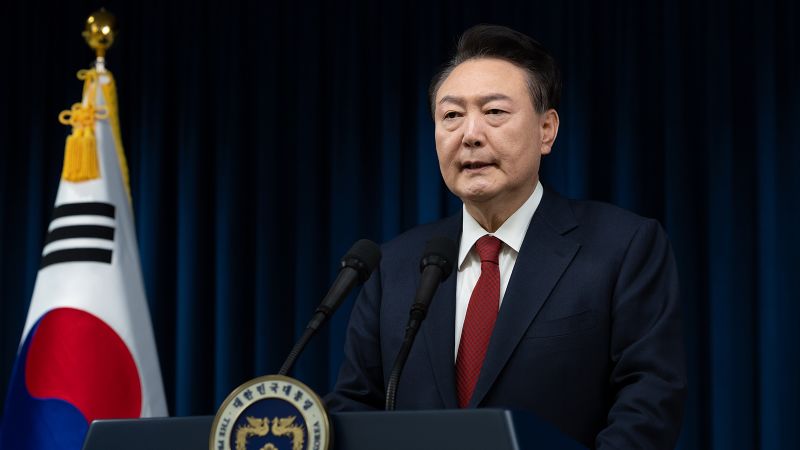CNN
—
South Korean prosecutors have indicted the suspended President Yoon Suk Yeol on insurrection charges over his brief declaration of martial law.
Yoon attempted to impose martial law in early December, a move that plunged the country into political turmoil and for many brought back painful memories of the country’s authoritarian past.
The president justified the declaration by accusing the main opposition party of sympathizing with North Korea and of anti-state activities but it was swiftly overturned by parliament.
Yoon – who denies wrongdoing – was then voted to be impeached by parliament and has been in custody since being arrested last week.
Prosecutors announced the charges on Sunday evening local time, making Yoon the first sitting president in the country’s history to be indicted.
“Based on the investigation so far, there are no grounds to consider any change to the arrest warrant issued against the president,” prosecutors said in a statement Sunday, adding that “sufficient evidence exists to substantiate the charges.”
During parliamentary hearings, Yoon’s commanders testified that they received direct orders to break down the doors of the parliament to “drag out” lawmakers sitting inside. Yoon has denied this.
Shortly after declaring martial law, Yoon allegedly told the first deputy director of the National Intelligence Service, Hong Jang-won, he should take the opportunity to “arrest” a list of 14 political and legal figures including the opposition leader and “clean everything up.”
Yoon allegedly said he would give the intelligence service authority to launch a counter-intelligence probe and “support it with funds, personnel unconditionally.”
Details were first revealed to reporters by lawmakers briefed about the conversation, and Hong confirmed to CNN the veracity of the content.
The move is the latest development in a political saga kicked off by the president’s martial law declaration.
The embattled president had been holed up in his fortified residence for weeks surrounded by his Presidential Security Service team before his arrest.
The country’s Corruption Investigation Office for High-Ranking Officials (CIO) first attempted to detain him earlier this month, but it failed after an hours-long showdown in which soldiers and members of the presidential security detail blocked some 80 police and investigators from approaching the presidential compound.
The CIO was able to arrest Yoon on their second attempt, but Yoon has been refusing to cooperate with any of the CIO’s investigations.
Yoon’s party dismissed the indictment, calling the CIO’s investigation records “illegal.”
His lawyers said “the prosecution has committed a historic mistake” in a statement, claiming that Yoon’s declaration of martial law does not amount to an insurrection crime.
South Korea’s main opposition Democratic Party, however, welcomed the indictment and urged the court to hold Yoon “accountable for his violations of constitutional order and his trampling on democracy.”
With Sunday’s indictment, Yoon is now facing two trials: one over his impeachment case at the country’s Constitutional Court, which will determine his political fate – likely by spring -and decide whether he will be formally removed from the presidency or reinstated. The second is the criminal case of insurrection.
Yoon – who is a former prosecutor – could face life in jail or the death penalty if convicted of leading insurrection, although South Korea has not executed anyone in decades.
Under South Korean law, a sitting president has immunity from most criminal prosecutions, but the privilege does not extend to allegations of insurrection or treason.
Yoon’s former defense minister Kim Yong-hyun, some military commanders and police chiefs were also previously indicted following Yoon’s declaration of martial law.


